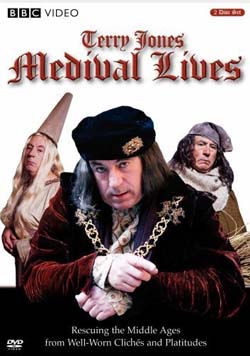How fitting that the BBC sought out Terry Jones to host and co-write this eight-part series dispelling the commonly held myths about the Middle Ages. Everybody knows he directed, co-wrote and co-starred in the Pythons’ first movie parodying King Arthur. What I didn’t know until now was his expertise on the pre-Renaissance UK. More on this later.
Each half-hour segment focuses on a standard profession/role of the era: Peasant, Damsel, Monk, Knight, Minstrel, Philosopher, Outlaw and King. Jones opens them all with the general story people tell as he acts in the role of the subject. Then he proceeds to demonstrate that many realities regarding the Medieval days are concoctions written from later eras, especially the Victorian period.
Some things I already learned in college or through books: King Richard the Lionhearted was a disastrous ruler; monks and nuns were far from upstanding Christians; Richard III was the victim of Tudor revisionism; the Knight’s chivalric code was rather subjective; Philosopher was more of a blanket term for Scientist or Doctor; few thought the world was flat.
Thankfully, I gained a greater understanding than I anticipated when I added this to our Netflix queue: There was more gender equality then (something D&D got correct by accident); Peasants were more self-governing than I thought (Jones found a community which still uses Medieval legal practices on land usage); Why were Philosophers obsessed with gold (hint, it had nothing to do with wealth); People weren’t as prudish then, they were quite the opposite with their sexuality.
Jones has created an excellent, mandatory supplement for teachers covering the Medieval period. It simultaneously eradicates the romanticized version of the past Hollywood loves and counters the consensus that it was a dark time filled with ignorance, illiteracy and superstition.
While writing an earlier draft of this, I stumbled upon his larger body of literary work which I hope to read in the near future. A paperback companion to Medieval Lives, published three years after the show; something regarding the murder of Chaucer; and an alternate account about the barbarians who destroyed the Roman Empire.

